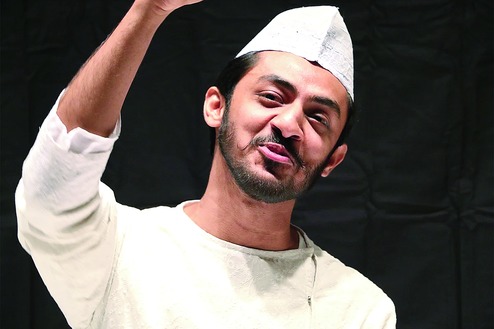
1987-2018
If the dastan didn't get you hooked, the goi would. Writer and storyteller Ankit Chadha made sure of that by the time the audience trooped out that day in March last year after a poetry and riddle session.
Chadha was on a visit to Calcutta, enthralling audiences with his wit, reaching out, tantalising them with clues before drawing them into a participatory chorus.
No, it wasn't his speciality - Dastangoi, the oral art of Urdu storytelling. The term means the Persian concoction of dastan (tale) and goi (the act of narration). Rather, that late-winter evening, the author of Amir Khusrau - The Man in Riddles, was in town to talk about Khusrau, the Sufi poet, musician, mystic and scholar.
It took him only an hour to hold up before the audience Khusrau's life - through riddles.
" Gala katey, woh choon naa karey,
Aur moonh rakt bahaaye
So pyaari baatein karein,
Fikar katha dikhlaaye," he intoned.
(Throat slit, he doesn't make a sound/Blood drips from his mouth/ He tells tales like a child/And makes the imagination go wild.)
"Anyone has a clue what I am talking about?" he asked.
Mouths parted, then shut. Embarrassed fingers leapt to lips.
"No one?" he was almost cajoling.
Then someone said, " Paan". More a question than answer.
" Paan," many chorused.
"Yes." And the audience was hooked.
To know a story is one thing, to tell it is another. It was in his narration that the magic lay.

The session was both a visual and an aural treat. The slim young Chadha, dressed in jeans and kurta, had in no time turned it into an interactive session. The riddles flowed, probing and asking, exhorting the audience to rack their minds. They had to guess right, for he wouldn't give the answer.
He knew how to romance with riddles. The takeaway: the audience got to know who Khusrau the person was. His talents and his personality, a firm believer in God, a poet, a scholar, a historian, a musician and a mystic.
Chadha had started the session in flawless, chiselled Urdu, with one of Khusrau's famous poems:
" Khusrau dariya prem ka, Ulti waa ki dhaar, Jo utra so doob gaya, Jo dooba so par. (Oh Khusrau, the river of love, runs in strange directions. One who jumps into it drowns, and one who drowns, gets across)."
But life turned out different. The storyteller who had drowned himself in Khusrau didn't "get across" in the real river of life.
Chadha drowned in a lake near Pune on May 9. He was only 30.
Chadha was very fond of children and he knew that kids love riddles, said Poonam Girdhani, a Dastango who has performed in several shows with Chadha.
"He would do storytelling sessions with children and the book is not only about Khusrau's life but also has life lessons," she said. "It's written in a way that even children find it interesting."
Girdhani and Chadha had together performed Dastan Alice Ki, an adaptation of Lewis Carroll's Alice's Adventures In Wonderland, in Delhi in 2014, which became rather popular.
"Whenever we performed, it was spontaneous. People used to love us together on stage. Ankit's mother used to be our first audience. If she smiled, we felt the show would work. If she didn't, we knew we had to work on it," Girdhani said.
Chadha, who had trained in Dastangoi under writer and director Mahmood Farooqui, had left a corporate job and devoted his life to being a Dastango, playing an important role in reviving the fabled art form.
He was considered the youngest Dastango in the country who made the world his stage, performing at Harvard, Yale and the University of Toronto.
Chadha's Dastangoi also covered the lives and works of figures such as Kabir and Mahatma Gandhi.
"I always knew that Ankit knew the reality of life - that this life is not all. This life is like a costume which we are wearing so that people can identify us. But there is much beyond it. Physically, he is not with us anymore. I cannot touch him, talk to him, I cannot see his face, his smile. But I am sure his journey has not ended," Girdhani said.
"Ankit used to quote a saying - ' matka jo banate hain, us par unke hathon ke nishaan reh jate hain. Theek waise hi kahani mein sunane waale ki rooh reh jati hai. (Just like the imprints of the potter's hand remain on the pot he has shaped, the storyteller's soul remains in the stories.) So, as long as dastans are there, Ankit will be there in the dastans," she said.
In a very short time, he has given us stories, memories and insights.
Words from another poet echo through my mind as I remember Chadha. " Jaate hue kahte ho qayamat ko mileñge (While leaving, you say, we'll meet on Doomsday)," Mirza Ghalib had written in one of his poems.
" Kya khoob! Qayamat ka hai goya koi din aur (That's a good one! As if Doomsday is some other day!)"
It was the first session of Chadha that I attended. I didn't know that it would be the last.










